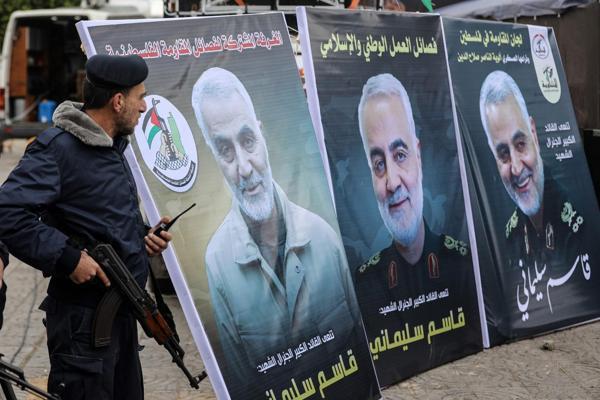Iran's top security body vows 'revenge' for Soleimani
BAGHDAD-Anadolu Agency


Iran's top security body has vowed "harsh retaliation" to the killing of military commander Qasem Soleimani in a U.S. drone airstrike in
Iraq.
"The regime of the United States will be responsible for all the consequences of this criminal adventurism," Iran's Supreme National Security Council (SNSC) said in a statement following an emergency meeting late on Jan. 3.
"The U.S. should know that the criminal attack against Gen. Soleimani was its biggest strategic mistake in West Asia and it will not easily get away with the consequences of this miscalculation," it said.
Soleimani, the leader of Iran's Revolutionary Guards' Quds Force, was killed along with his close aide Abu Mahdi al-Muhandis, a senior commander of Iraq's Hashd al-Shaabi force, when a U.S. drone struck their convoy outside Baghdad's airport on Jan. 3.
The Iranian general's killing marked a dramatic escalation in tensions between the U.S. and Iran, which have often been at a fever pitch since President Donald Trump chose in 2018 to unilaterally withdraw Washington from a nuclear pact the world powers struck with Tehran.
Iranian Supreme Leader Ali Khamenei, who gave Soleimani the country's highest honor last year, vowed "severe retaliation" in response to his killing.
"As stated by the Leader of the Islamic Revolution in his recent message, tough revenge is awaiting the criminals who spilled the noble blood of General Soleimani," the SNSC said in its statement.
"These criminals shall face the strongest retribution of revengers of the blood of General Soleimani in the right time and the right place."
The Pentagon accused Soleimani of plotting an attack on the U.S. Embassy compound in Baghdad and planning to carry out additional attacks on U.S. diplomats and service members in Iraq and the region.
Iraq says US military presence in the country could be ended
Iraq's National Security Council suggested that Baghdad could ask Washington to withdraw troops from the country on the heels of a
U.S. airstrike in the capital Baghdad.
The council in a meeting on Jan. 4 chaired by Iraq's Prime Minister Adel Abdul-Mahdi discussed a U.S. airstrike that killed Soleimani and al-Muhandis.
Condemning the killing, the council declared that the attack violated the country's sovereignty.
It said the U.S. strike had transgressed the conditions for the presence of U.S. forces in Iraq, calling on the country's parliament to hold an
emergency session on the matter to make a decision on whether to put an end to the U.S. military presence in the country.
Abdul-Mahdi also called on lawmakers to take legislative measures "to safeguard Iraq's dignity, security and sovereignty".
Iran's next move
Observers believe that the Iranian threats of retaliation may not necessarily mean a direct military confrontation with Washington.
"The possibility of a direct, all-out military confrontation looks very improbable at the moment because Iran will not start the war and the U.S. knows the heavy price it will pay if it pulls the trigger first," Farhad Abdollahi, a security analyst and writer, told Turkey's state-run Anadolu Agency.
He, however, said the possibility of attacks by Iran and its allies on U.S. soldiers and facilities in the region was still high.
"America has many bases and vessels in the region, which are well within the reach of Iran, and Washington has troops in many regional countries that are at the mercy of Iran now," Abdollahi said.
According to sources in Iraq, Iran-backed Hashd al-Shaabi force is also contemplating its next move to seek revenge for Soleimani's killing.
Following Soleimani's killing, firebrand Iraqi cleric Muqtada al-Sadr ordered his militia to get ready to "defend Iraq" and to "out U.S forces" from the country, which observers believe would make the continued presence of U.S. troops in Iraq virtually unsustainable.
"It should be a cause of grave concern for Trump the way he has exposed every footprint of the U.S. in the region, especially in Iraq, to
potential Iranian attack," Mahmoud Fattahi, a strategic affairs analyst, said.
On Jan. 3, Khamenei issued a decree appointing Soleimani's long-time lieutenant Gen. Esmail Qaani as the new leader of Quds Force.
Unlike the popularity of his predecessor, Gen. Qaani is a low-profile commander who has until now been in the shadow of Soleimani.
Known for his strong opposition to the U.S. policies in the region, he has often issued strong statements against Washington.
In 2017, Qaani was quoted saying that U.S. President Donald Trump's threats against Iran will damage America. “We have buried many… like Trump and know how to fight America,” he had said.
